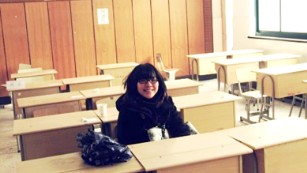Why failing the gaokao was the best thing that ever happened to me
This week, millions of Chinese high school students will take the two-day college entrance exam, or gaokao.
When I took that grueling test in 2009, I had been told since I was a small child that it would be the most important task I ever completed.
For generations of Chinese -- and this still holds true for thousands living in rural China today -- a college education was their one ticket to success and upward mobility. Failure meant no degree, poor job prospects and a life full of regret.
So I studied hard, got into key junior and high schools, and hoped to get into a good university in Beijing. To study what, I didn't know.
Fear of failure
Studying for gaokao was exhausting both mentally and physically. A typical high school senior's day ran from 7 a.m. to 5.30 p.m. Most of my classmates stayed in school for an extra self-study session that didn't end until 9 p.m. I was one of the few who chose to study at home at night, mainly to escape the tension hovering in the air.
Teachers would tell us to focus on nothing but our studies. Parents would do anything and everything to ensure an optimum learning environment for their children.
Would you pass the test? Take our quiz
Gaokao: China's toughest exam
Millions of students across China are sitting the "gaokao" this week, which decides which university they will go to. The famously hard quiz causes huge amounts of stress and has led to several major cheating scandals, how will you fare against some of its easier questions?
Start the quiz
Even my mother and father, far less stressed out than most Chinese parents, would cook me an extra meal every night when I was preparing for the gaokao, even though I didn't really need it.
At home, I would usually sit at my desk after dinner, trying to make sense of the mumbo-jumbo, while sneaking peeks at a magazine or book hidden beneath my work, always wary of a sudden parental inspection. This of course only stretched my already extended days even longer.
Torn up by the guilt of not studying hard enough and fear of failure, I developed severe anxiety, having to rely on medication to sleep during my last year of high school.
When it came to the test itself, I failed spectacularly.
'My life is doomed'

Shen Lu revisits her old high school classroom in 2011, two years after taking the gaokao.
The day the results were released, I thought I was prepared for bad news. But when it came, my brain went into shock. I thought my life was doomed. I was so ashamed I locked myself in my room all day until my worried parents broke through the door.
I had hoped to go to a university in Beijing to study languages, a hard ask for a kid from the provinces. Of course that didn't happen.
My parents asked whether I would consider studying another year and sitting the test again. The thought sent a shiver down my spine. I said no.
Instead, I attended a third tier university in my hometown on Hangzhou. I majored in editing and publishing. It wasn't bad, but I was unhappy and unmotivated. During my two years there I never completely understood why I had to study so much extra nonsense, or why my fellow students were so obsessed with joining clubs and organizations to get "leadership experience" (something I later discovered wasn't unique to Chinese universities).
Journey to the West

Chinese student enrollment surges at University of Iowa
So I dropped out, in what many of my fellow students probably thought was an insane decision, and transferred to the University of Iowa in the U.S. to study journalism.
Thinking back, the stress and heartache of the gaokao seems somewhat insignificant. My life was neither changed or ruined by my "failure."
What truly shaped me were my experiences at Iowa, where I studied journalism, developed a passion for it and cherished every opportunity I got to practice.
I'm actually rather grateful I failed the gaokao. Had I gone to a prestigious Chinese university, I would never have experienced Western schooling -- a system not without its own flaws -- and I would certainly not have understood the true meaning of education.
I worked far harder at Iowa than when I was in high school. By that time, I had matured and knew what I wanted. I wanted to get the most out of my education and ensure every penny my parents paid for my tuition -- twice as much as local American students -- was well spent.
Today, I couldn't answer any of the fearsome gaokao questions, but if I took anything away from that unpleasant, unsuccessful experience, I think it was a simple truth: no pain, no gain.
News Courtesy: www.cnn.com











